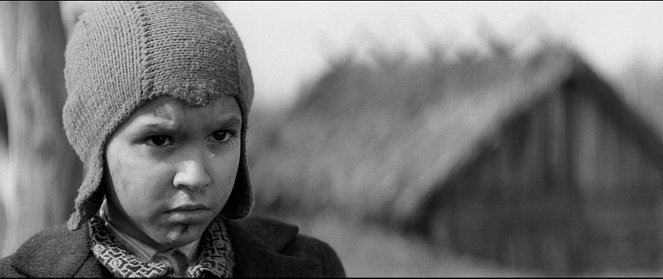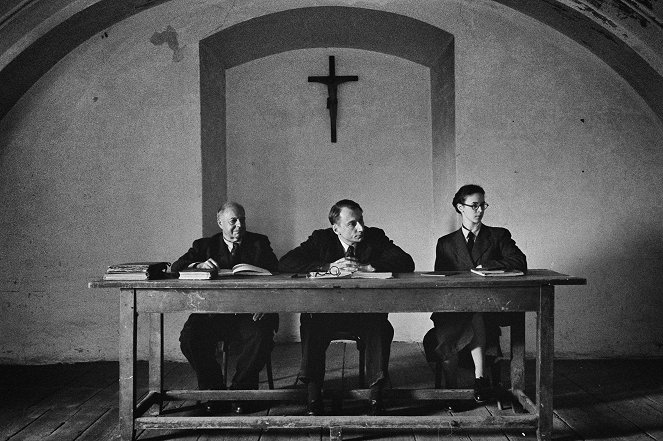Directed by:
Václav MarhoulScreenplay:
Václav MarhoulCinematography:
Vladimír SmutnýCast:
Petr Kotlár, Udo Kier, Michaela Doležalová, Zdeněk Pecha, Lech Dyblik, Jitka Čvančarová, Stellan Skarsgård, Harvey Keitel, Julian Sands (more)Plots(1)
The film follows the journey of a boy, entrusted by his Jewish parents to an elderly foster mother in an effort to escape persecution. Following a tragedy, the boy is on his own. Wandering through the desecrated countryside, the boy encounters villagers and soldiers whose own lives have been brutally altered, and who are intent on revisiting this brutality on the boy. When the war ends, the boy has been changed, forever. (Eureka Entertainment)
(more)Videos (4)
Reviews (11)
Ideally, Czech cinematography should have a big, ambitious film like this at least a couple of times a year, so one The Painted Bird wouldn’t get such an aura. But we don’t have that and with this work Marhoul is objectively several streets head of any recent Czech competition, and they simply can’t catch him. A great and stylish film, world-class. I didn’t enjoy it enough for a five-star rating because it’s not really possible to “enjoy” it. It is exhausting, rather. But a well earned four starts, without any doubt. Now, to create a media aura around this film as if it was some sort of exploitation war horror movie is incredibly absurd. Sure, there are some horrible and monstrous things, but Marhoul approaches them with a lot of decency, with chastity almost. And if the hysterical responses from Venice are anything to go by, it's just that the snobs from these big festivals like to fall into cheap headlines ... and that crap will last.
()
The biggest problem is that the whole movie is cold as a dog's snout. The much-proclaimed (swooning festival-goers, women running out of the theater) and mentioned explicitnesses are only rarely impressive in their own right – for me the highlight was ironically the sumptuous camera shot at the beginning of the film, when the main character is launching a boat down the river and the camera takes the whole scene nicely from the surface of the river upward in a kind of "aerial arc". The problem might also be (for me) that I was expecting a completely different film. After the reviews from Venice I was expecting agony, but honestly only one single scene stuck with me a bit, the one from the barn (I won't spoil it, it takes place in the second half of the film and one of those involved is a crazy woman), otherwise everything kind of happened and I kept saying to myself: "Okay, we've ticked off non-consensual sex, next we'll have murder, then abuse, and what's next, Václav?" The film suffers terribly from its format, where it wants to be poetic on one hand (and in which it succeeds to some extent, thanks to the black and white imagery and some really nicely shot scenery) and at the same time convey a powerful and intimate message. "Storytelling through images" is an art in itself, but Marhoul has simply not yet grown there compared to the world's best. I've read in reviews that the biggest difference from the book is the lack of the main character's inner monologues. I dare say (and I haven't read the book) that if Marhoul had retained these at least in part, all of The Painted Bird could have had a much stronger emotional charge. In this film adaptation, there are "just" unpleasant things happening, with a young and "different" boy running around in between it all as he really just tries to survive and get back home (whatever that means). And the psychological evolution of the boy into his tougher self is so terribly cheaply rendered that it felt like downright shoddy work from Marhoul. The film has no proper psychological or emotional depth. There is, of course, a strong social motif, where the black and white shots of the demonic faces of the lifeless villagers are quite chilling. But the whole of The Painted Bird still suffers from a spasmodic episodicity that hopelessly undermines any more powerful lasting impression. Too bad; I'd like to give it more, but I just can't. Still, I must say that I doff my cap to Marhoul, because once again he has put us in a wider awareness than just from Aš to Krnov. The most emotional part of the whole film is that Slavic song in the closing credits.
()
After Tobruk, Václav Marhoul convinced me for the second time that he and I are simply not on the same wavelength. Now, after the almost three-hour ‘frantic ride,’ I can’t help but wonder what he wanted to convey with this film. Next to Come and See and Hatred, The Painted Bird feels rather underwhelming. The information that the story takes place during WWII came to me only in the form of a Storch flying over, other indications appeared much later. I still don't know where the story was set (Carpathian Ruthenia?). I also didn't understand why the little Jew was played by a Gipsy. The story unfolded in a very awkward way. Throughout the film I felt like it was weirdly cut, I was annoyed by its strange rhythm: boring, boring, boring - brutal violence - boring, boring, boring - brutal violence - boring, boring, boring – pedophilia - boring, boring, boring - zoophilia, etc. I also didn't understand why there was violence in the film in the first place when the creators were obviously more afraid of it than the viewers. That way, most scenes look silly bordering on ridiculous. For example, the completely pointless zoophilia scene had me in stitches, Václav Marhoul can't have been serious. On the other hand, if Fifty Shades of Grey gives you goosebumps, this will be a rough experience for you, which might even lead to some involuntary bedwetting. At least I already know what those awards were for. Wait... actually, I don't. P.S. Those bikini tan lines on Denisa Pfauserová sure looked historically accurate :-)
()
I think the controversy over The Painted Bird is largely an inflated bubble, and I think those leaving audiences in Venice were leaving mainly because they were bored and it wasn't the film for them, it's just that when someone asked them the reason, they just didn't want to be embarrassed and made excuses for the unbearable brutality and that was that. I'm not saying the film is a pleasant spectacle, it's certainly not, but it's a great spectacle and Václav Marhoul has a point. So while there are ugly things happening on screen, there's almost never a need to show them directly in an attempt to shock as much as possible; many times the silence before the storm is even more uncomfortable, or the mere sound of something just happening out of frame. Perhaps what I like most about The Painted Bird, though, is that it's entirely a world film, even though it doesn't try to be one. It’s not exhibitionistic, it remains focused on telling the sordid tale of a journey from darkness to light, aided by excellent actors as much as by Vladimír Smutný's breathtaking cinematography and Marhoul's beauteous direction. It's not for everyone, but that's okay.
()
In terms of technical aspects, filmmaking and production values, Marhoul's masterpiece is a film of world-class level. Considering what has been produced in our country for the last 30 years, considering how miserable it is, this film has absolutely no comparison and the whole Czech post-revolutionary cinema is following it with its tongue hanging out like a exhausted dog. But I have one problem with it, or rather with its source material. The reason it didn't even tickle me emotionally at all is the fact that I didn't believe the sincerity of the message. You know, Jerzy Kosinski was a bit of an exhibitionist. He loved the spotlight, he loved to be talked about, and he just kind of showed off in his flagship work. The film commendably doesn't try to shock at all costs, rather it keeps a low profile, but it couldn't leave out some key scenes. So here too, as in the book, they are playing for effect. We see gouged eyeballs rolling on the ground, rape with a bottle, sex with an animal (but it should be noted that the camera takes it as subtly as possible) and even the restrained scene with the sniper and the cruel disposal of the paedophile is actually playing for effect in a way. Nothing happens naturally, I just didn't believe it, and emotionally it left me cold. Kosinski (and therefore the film) took a stereotypical approach to female characters, the two major female characters are both sexually disturbed aggressive nymphomaniacs, but at least he left the auntie out of it (big smiley face). Okay, I just have a big problem with the book, but not with the film in principle. Anyway, that cinematography! It’s world-class, really world-class. Every shot is thought out to the smallest detail, the beautiful long-shot compositions (in the bottom shot of Čvančarová walking naked in forest meadow you can clearly see Marhoul's inspiration from Alexandria in Marketa Lazarová) alternate with interior shots where it’s a joy to watch the play of light and shadow, simply beautiful. In fact, it wasn't until the end that I realized that there wasn’t any music and yet it didn't matter. That is also an art, to tell a story only in pictures, and here I give Marhoul a thumbs up. Aside from the final "chapter" when the boy gets to the civilized world and the narrative gets a bit bogged down and tedious, the film flew by very quickly. The pace is slow but engaging, so the three hours felt like an hour, and that's also a good report card for Marhoul. I'm glad I watched it, but I'm also glad I'm clear about which book I don't want in my collection PS: But I'm gonna take a crack at Marhoul anyway. He openly acknowledges Klimova's Come and See as a source of inspiration, also thanks to the presence of Alexei Kravchenko in one of the smaller roles. But when I compare little Kravchenko and Petr Kotlár, it's like heaven and smoke. At the end of Klimov's film, Kravchenko is a little old man, a boy with grey hair on whom the hardships of the war were indelibly and forever etched. Kotlár, in contrast, is so pudgy at the end, his face shows no hint of any hardship, he might as well sign up for some child modeling. So here I had a big problem with authenticity and the assurance that Come and See is simply on another weight category; in boxing terminology a Russian heavyweight vs a Czech Welterweight :o)
()
(less)
(more)



Ads